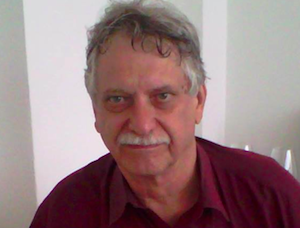BBG Watch Commentary
BBG Watch occasionally publishes guest commentaries. This one is from Gary Thomas. He spent 27 years at Voice of America before retiring in 2012. He was a senior correspondent and news analyst specializing in national security and intelligence issues. He served in Islamabad and Bangkok and covered stories throughout South and Southeast Asia.
We note that VOA Ukrainian Service covers many Russia and Ukraine related U.S. news events being ignored by VOA English news service which has been badly managed under the current VOA senior management. To our knowledge, VOA Ukrainian Service and Ms. Gongadze herself do not fall for Putin’s propaganda claims which have found their way without balance into some VOA Central English news reports filed by stringers and even on a few occasions by VOA English staff correspondents who are not experts on Russia. We also note that Myroslava Gongadze’s Facebook posts get many times more “Likes” — sometimes thousands — than VOA English news posts, which usually get a few dozen. The VOA Ukrainian Service’s TV program is popular in Ukraine. To our knowledge, Ms. Gongadze’s on-air reports have been flawless. Unlike Mr. Thomas and current VOA English news correspondents, VOA foreign language services correspondents have very little experience in traveling with high-level U.S. officials on news coverage trips abroad. The organization is badly managed. Ms. Gongadze may not have received any journalistic policy briefing prior to her trip, or she may have received wrong instructions. Mr. Thomas raises legitimate concerns. We agree with him that much of the fault can be attributed to lack of leadership or wrong leadership by senior Voice of America executives.
Views expressed in the guest commentary are only those of the author and not of BBG Watch, its volunteers, or sponsors.
We invite those with opposing views and others who want to comment on this or other issues followed by BBG Watch to submit their op-eds for consideration.
Guest Commentary

WHERE IS THE OUTRAGE NOW?
by Gary Thomas
BBG Watch has been in the forefront of exposing the missteps of the Broadcasting Board of Governors, with particular attention to the Voice of America. For that it is to be commended, for, although many disagree with its backing of what we view as a deeply flawed bill to renew international broadcasting, it has done much to foster debate on an issue that flies under the mainstream media’s radar.
But the comedy – some would say tragedy – of errors at BBG and VOA is not limited to English and the Central News Division, where BBG Watch has directed the bulk of its ire. No where is this more glaringly apparent than in the recent egregious breach of journalistic ethics and standards– including the VOA Standards and Practices – by a senior broadcaster of the Ukrainian service.
Myroslava Gongadze, self-described as “host, producer, and director at VOA” (see her FB page), recently traveled with Vice-President Biden to Ukraine. She was ostensibly traveling as a reporter, but acting as a Ukrainian activist. She was promoting her access to Biden. Her picture appeared in the LA Times alongside the vice-president at a memorial to activists killed – among them, her husband.
She also engages in lobbying activity, promoting “Friends of Ukraine” and calling for legislation on Facebook (and federal employees – much less VOA journalists – are not supposed to engage in any lobbying efforts).
Gongadze deserves our sympathy and our admiration, and it is understandable that she seeks some measure of justice about her husband’s murder. But she should not be using her status as a VOA reporter and broadcaster to do it. She has inserted herself into a news story, which is something journalists simply should not do. However much one sympathizes with Gongzade’s tragedy, professional ethos demand that, to avoid doing harm to VOA’s journalistic reputation, she either refrain from political activism or totally recuse herself from journalistic activity in a story in which she is personally involved.
Activism for political causes, especially human rights, is highly laudable. But it is problematic for journalists. Political activism compromises journalistic integrity and make it more difficult for people to trust an organization’s coverage because of the belief in the reading, listening, or viewing public that there is an agenda at work. This is more true for VOA than other news organizations because such actions encourage policymakers to believe that its news coverage can be manipulated for political purposes. Going down that path opens the door for greater pressure on VOA journalists to hew to particular stories and story lines, rather than their own news judgment.
The VOA Standards and Practices document is quite specific and unambiguously clear on the issue of journalistic conflicts of interest: “VOA journalists are also reminded they should not use their professional affiliation with VOA to advocate for political or social causes and when speaking to outside groups, they should refrain from taking sides on public issues.”
It goes on to add: “Staff members should not march or rally in support of public causes or movements or sign advertisements or petitions taking a position on public issues, domestic or foreign… Staff members should not serve on boards or commissions, paid or unpaid, here or abroad. They should not join advisory committees or similar groups. The recommendation on not joining boards or advisory committees applies to emigre groups.”
In sum: “Employees must strive to avoid any action that would create even the appearance that they have lost impartiality or are violating the law or ethical standards.”
This is not unique to VOA, of course, nor should it be. The Society of Professional Journalists just this year enacted a revised Code of Ethics that says:
“Journalists should avoid conflicts of interest, real or perceived. (They should) disclose unavoidable conflicts (and) refuse gifts, favors, fees, free travel and special treatment, and avoid political and other outside activities that may compromise integrity or impartiality, or may damage credibility.”
Journalists often do end up being part of a story. But that personal involvement in a story usually is and should be by and large inadvertent, such as being taken hostage. To directly become part of a story, most especially a politically sensitive one, is wrong. Full stop.
“What about the First Amendment rights of free speech?” I can hear emanating from some quarters. Well, journalists give up certain rights to serve a higher purpose. We are like monks, taking our own vows of journalistic celibacy that necessitate our limiting or giving up certain rights of speech and association in order to practice our vocation with objectivity and fairness. Journalists have to be, to use the Shakespearean term, cleaner than Caesar’s wife. They must refrain from political activism – no matter how well-meaning and worthy the cause may be – to maintain professional neutrality and, by extension, credibility.
What makes this episode more shocking is that this must have been condoned by VOA top management. No one with even passing familiarity with VOA and BBG practices could think that Gongadze could have embarked on a high-profile trip with the Vice-President of the United States and engaged in political advocacy without the express permission – indeed, even encouragement – of the highest officials of the Voice of America.
This is all the more disturbing if is a harbinger of the future of VOA envisioned by VOA and BBG management.
Is VOA totally erasing any demarcation between journalism and activism? How can VOA be seen as anywhere near objective when an activist is reporting on the very story in which she is personally engaged?
The BBG website calls her “Myroslava Gongadze, VOA Journalist and Ukrainian Rights Activist.” Professional standards say you should not be both. Which is it to be?

Comments are closed.